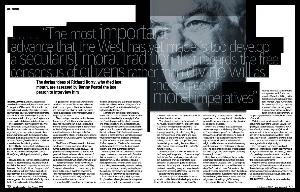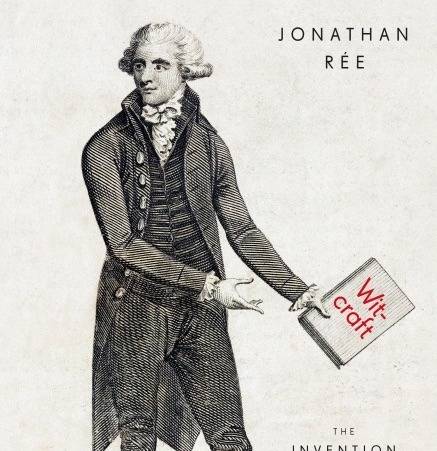
In contrast to this “boring atheism” one finds the atheism of a Voltaire, a Marx, a Nietzsche, a Freud, a Russell: volcanic intellectual confrontations that regard religion as mendacious, narcotic, slavish, illusory, pernicious. With their impassioned polemics and very public salvos, the so-called new atheists—Dennett, Dawkins, Harris and Hitchens—are clearly of the unboring variety.
Richard Rorty—the most influential American philosopher of the last three decades, who died in June—would undoubtedly have counted himself, along with Appiah, in the boring atheist camp.
He was, decidedly and very openly, an atheist. Indeed he had much to say about religion and secularism that would bring smiles to the faces of humanists. But Rorty’s critique of religious belief took a different tack from that of most atheists—especially from those whose rejection of faith relies on scientific arguments. Late in life Rorty even suggested that “anticlericalism” might be a better term for his outlook than “atheism.”
’ll get to Rorty’s divergences with scientific atheists in a moment. First let me underscore their common ground. Consider the following expressions of what we might call Rorty’s “strong,” as opposed to his more attenuated or sceptical humanism.
“The most important advance that the West has yet made,” he told me in what would be his final interview, is the shift in outlook resulting from its having “cobbled together, in the course of the last two hundred years, a specifically secularist moral tradition—one that regards the free consensus of the citizens of a democratic society, rather than the Divine Will, as the source of moral imperatives.”
“The 16th- and 17th-century notion that man would never be able to let go of religion has turned out to be wrong,” he said in 1995. “The promise of the Enlightenment came true: that you could have a society which had a sense of community, without any religious agreement, and indeed without much attention to God at all.”
“We atheists, doing our best to enforce Jefferson’s compromise, think it bad enough that we cannot run for public office without being disingenuous about our disbelief in God,” he wrote in 1994. The claims of religion “need, if anything, to be pushed back still further”: “religious believers have no business asking for more public respect than they now receive.”
“The members of the fundamentalist churches in the US,” he remarked in 1997, are “just not trustworthy citizens of the country.”
Even in his 2002 essay about his preference for the term “anticlericalism” over that of “atheism,” he declared otherworldliness “dangerous” and expressed hope “that institutionalized religion will eventually disappear”!
So there is no doubt that Rorty was a humanist and secularist to the core. But his atheism was one that he called “postmetaphysical” or even “postphilosophical,” by which he meant one “that doesn’t have any surrogate for God.”
The Enlightenment dethroned the divine—and Rorty was plenty glad for it—but replaced it, as Rorty saw it, with new, secular gods like Nature, Reason, Truth, Reality, and Human Nature. (He uppercased these terms to emphasise what he viewed as their exaltation or fetishization.) We are just as badly in need of eschewing God’s surrogates as of God—in fact even more so, Rorty argued, because of the loosening of religion’s grip on us over the last century. Religion, he remarked in 1997, “is not as much of an issue as it was in 1900.” (At least not in Western Europe, he might have thought to add.)
While religion in the secularised West may no longer possess the power it once did, Rorty held that we remain firmly under the spell of a foundationalism every bit as fantastic as its supernatural predecessor: we think of our beliefs and truth-claims, however secular, as corresponding to and grounded upon a reality existing beyond the language games we’ve invented to get on in the world. (For Rorty, they do no such thing.)
Thus rather than attacking religion, most of Rorty’s intellectual energies over the last quarter century were devoted to popping these foundationalist balloons and imagining what it might be like to live without them.
“A poeticised, or postmetaphysical culture,” he mused, “is one in which the imperative that is common to religion and metaphysics—to find an ahistorical, transcultural matrix for one’s thinking, something into which everything can fit, independent of one’s time and place—has dried up and blown away.” “It would be a culture,” he said, “in which people thought of human beings as creating their own life-world, rather than as being responsible to God or ‘the nature of reality’, which tells them what kind it is.”
“Scientific realism and religious fundamentalism,” he argued, “are products of the same urge.” Both, he said, “are private projects which have got out of hand. They are attempts to make one’s own private way of giving meaning to one’s own life—a way which romanticises one’s relation to something starkly and magnificently nonhuman, something Ultimately True and Real—obligatory for the general public.”
“Whereas the philosophers who claim that atheism, unlike theism, is backed up by evidence would say that religious belief is irrational,” he wrote in 2002, “contemporary secularists like myself are content to say that it is politically dangerous. On our view, religion is unobjectionable as long as it is privatised.”
Even in one of Rorty’s most passionately secularist essays (the felicitously titled “Religion as Conversation-stopper”), he challenged his fellow atheists: there is hypocrisy, he insisted, “in saying that believers somehow have no right to base their political views on their religious faith, whereas we atheists have every right to base ours on Enlightenment philosophy. The claim that in doing so we are appealing to reason, whereas the religious are being irrational, is hokum.”
Rorty thus urged a shifting of the ground in arguments for secularism away from the question of religion’s Objective Truth—a concept he regarded as fictional and one we’d be better off if we dropped. Thus the “principal concern” of secularists, he argued, “must be the extent to which the actions of religious believers frustrate the needs of other human beings, rather than the extent to which religion gets something right” (or wrong).
Though in a different key, Ronald Aronson recently advanced something like this argument in his front-cover essay for The Nation of 25 June. Calling for the formation of a “broad secular coalition,” Aronson urged humanists to focus on the political ground they share with others, including even religious opponents of fundamentalism (of whom there are many as it happens), in defending the constitutional wall of separation.
While this strategy sidesteps the directly intellectual fight many humanists of the Dennett-Dawkins sort spoil for, as a purely practical matter (and Rorty was, after all, an ardent pragmatist) doesn’t it make sense to unite as many people as we possibly can in the political battle we face—especially, alas, in the US—against the growing threat posed by the anti-secularist, counter-Enlightenment agenda of the religious right?
I certainly think so. And yet the project of humanism isn’t only a political one. Its political component is essential, to be sure. But we of course also deal with the issue of religion in the existential realm of our private lifeworlds—perhaps most saliently in the process of raising children, as I myself am currently doing. What do we say to children about God, the meaning of life, and why there is something rather than nothing? While we don’t confront these questions in a cultural or political vacuum, we are left, in the end, to fashion responses to them ourselves, with our loved ones, outside the public square. Rorty’s strategy of shifting the argument onto a purely sociopolitical plane is inadequate to this task.
Rorty strongly suspected that secular culture owed its emergence to a set of specific material, sociohistorical conditions: “It seems to be the product of a wealthy, leisured elite which has time to worry about this kind of thing, time to imagine alternative futures.” He waxed enthusiastic about this development: “Now the things of this world are, for some lucky people, so welcome that they do not have to look beyond nature to the supernatural, and beyond life to an afterlife, but only beyond the human past to the human future.” Yet he worried about secularism’s prospects: “How long this can last, I don’t know. The world may not permit the existence of this…much longer.”
Rorty harbored—or perhaps oscillated between—strong doses of both pessimism and hope, moments of dystopia and utopia, a sense of impending ruin and a romantic humanism. His was a humanism without foundations, and thus too precarious for some.
Whatever formed the ground (or groundlessness) of Rorty’s humanism, we could do worse than its appeal, that “if we can work together, we can make ourselves into whatever we are clever and courageous enough to imagine ourselves becoming.”
Rorty on religion, atheism, secularism, and humanism
“Religious Faith, Intellectual Responsibility, and Romance” and “Religion as Conversation-stopper,” in Philosophy and Social Hope (1999)
“Religion in the Public Square: A Reconsideration,” Journal of Religious Ethics, Volume 31, Number 1 (March 2003)
“Antclericalism and Atheism,” in The Future of Religion, edited by Santiago Zabala (2005)
“Toward a Postmetaphysical Culture” and “There is a Crisis Coming,” in Take Care of Freedom and Truth Will Take Care of Itself (2006)
“Cultural politics and the question of the existence of God” and “Pragmatism as romantic polytheism,” in Philosophy as Cultural Politics (2007)
Danny Postel is the author of Reading “Legitimation Crisis” in Tehran: Iran and the Future of Liberalism and is one of the contributors to the book Take Care of Freedom and Truth Will Take Care of Itself: Interviews with Richard Rorty.
NB: This a longer version of the obituary which appears in the July/August issue of New Humanist. Its a web-exclusive

